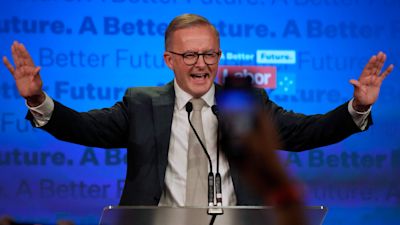Explainer
Anthony Albanese: Who is Australia's new Prime Minister and what does he stand for?

Australians awoke on Sunday to a new prime minister in Anthony Albanese.
The result, which is far from clear cut, reflects a rebuke of the country's traditional two-party system and a fierce rejection of Scott Morrison and his Liberal party.
Here's what you need to know about Anthony Albanese, and what his election means for Australia.
'A son of a single mom who was a disability pensioner, who grew up in public housing'
Mr Albanese has described himself as the only candidate with a "non-Anglo Celtic name" to run for prime minister in the 121 years the office has existed.
The 59-year-old has often referred to his humble upbringing in the inner-Sydney suburb of Camperdown.
"It says a lot about our great country that a son of a single mom who was a disability pensioner, who grew up in public housing down the road in Camperdown, can stand before you tonight as Australia’s prime minister," Albanese told jubilant supporters after tipping Scott Morrison out of office.
"Every parent wants more for the next generation than they had. My mother dreamt of a better life for me. And I hope that my journey in life inspires Australians to reach for the stars," he said.
ITV News Reporter Callum Watkinson rounds up a complicated result for Australia
Mr Albanese, who revealed in a 2016 interview he had tracked down his biological father in Italy in 2009, four years before his death, said his surname and that of new government Senate leader Penny Wong, who is of Chinese ancestry, reflected modern, multi-cultural Australia.
"I think it’s good… someone with a non-Anglo Celtic surname is the leader in the House of Representatives and that someone with a surname like Wong is the leader of the government in the Senate".
Why is the result a complicated one?
On Sunday morning, it remained unclear whether his party could form a majority government or whether the party would have to rely on the support of an increased number of independents and minor party lawmakers who won seats in Saturday’s election.
Counting is set to continue for many days as postal votes are tallied - but Mr Albanese's swearing in as acting PM could be rushed through so he can attend a Quad summit with US, Japanese and Indian leaders on Tuesday.
Want a quick and expert briefing on the biggest news stories? Listen to our latest podcasts to find out What You Need To know...
Needing 76 seats in the lower parliamentary chamber to govern in its own right, Labour has been called the winner having gained 71 seats with 67% of votes counted, according to the Australian Broadcasting Corp.
The Liberal-National coalition was ahead in just 52 - drastically down from its bare-majority 76 in the 2019 poll.
A total of 15 seats had been declared for independents or minor party candidates.
Why has Anthony Albanese been elected?
The election results deliver a clear rebuke of Australia's traditional two-party system, both to Labour and the heavily defeated conservative coalition led by the Liberal party’s outgoing PM Scott Morrison.
The major parties bled votes to fringe parties and independents, including in many seats considered Labor or coalition strongholds.
Analysts have called the result a fierce rejection of Mr Morrison and his team’s handling of many issues in its three-year term including climate, Covid-19, women’s rights, political integrity and natural disasters such as bushfires and floods.
Mr Morrison, who became PM after an internal party coup in 2018, said he would stand down as Liberal leader.
His popularity had waned dramatically since his surprise 2019 election victory, including after taking a vacation in Hawaii during Australia’s ravaging bushfires in the summer of 2019-20 and more lately amid the Solomon Islands’ strategic alliance with China.
What does Anthony Albanese stand for?
Mr Albanese has vowed to bring Australians together, increase investment in social services and "end the climate wars."
Speaking to reporters while walking his dog in his electorate on Sunday morning, Mr Albanese described his victory as "a really big moment."
He said: "What I want it to be is a big moment for the country. I do want to change the country. I want to change the way that politics operates in this country."
Greens leader Adam Bandt concurred, saying his party wanted to work with the next government to "tackle the climate crisis" and an "inequality crisis" he said was threatening Australia.
Labour has promised more financial assistance and a robust social safety net as Australia grapples with the highest inflation since 2001 and soaring housing prices.
The party also plans to increase minimum wages, and on the foreign policy front it proposed to establish a Pacific defence school to train neighbouring armies in response to China’s potential military presence on the Solomon Islands on Australia’s doorstep.
It also wants to tackle climate change with a more ambitious 43% reduction in greenhouse gas emissions by 2030 and net zero emissions by 2050.